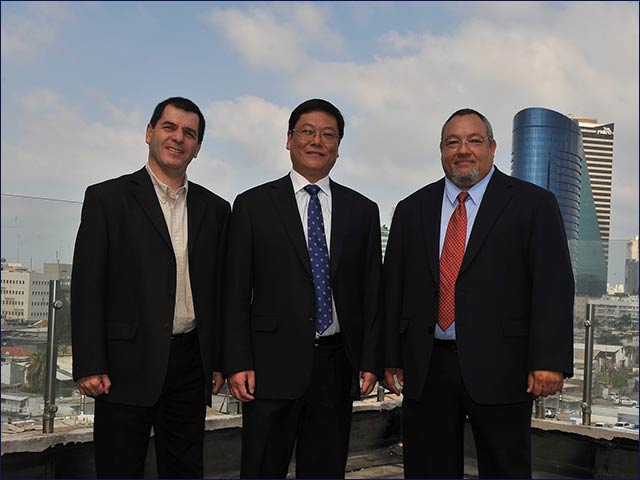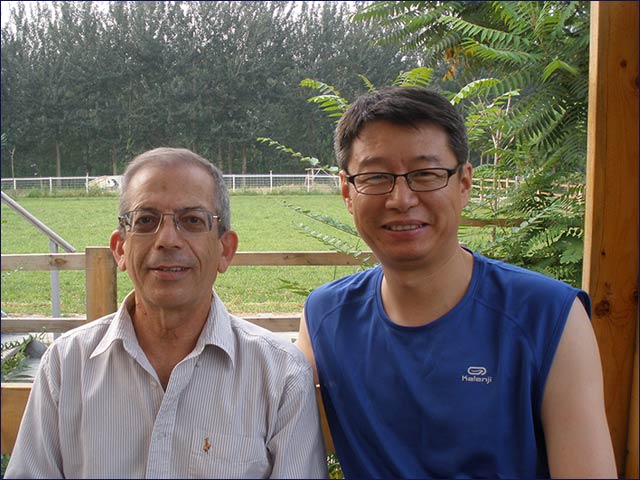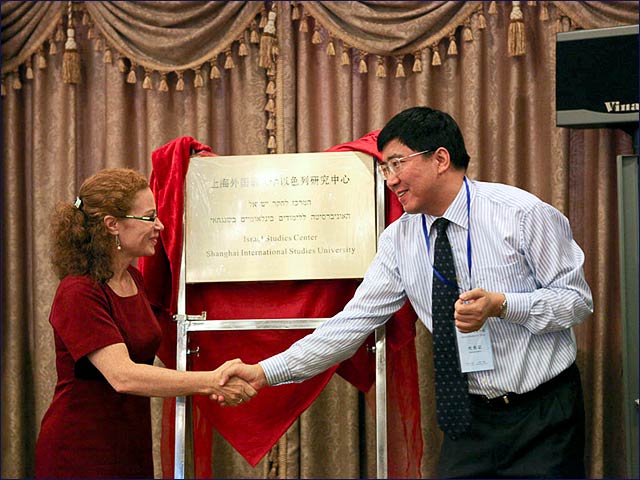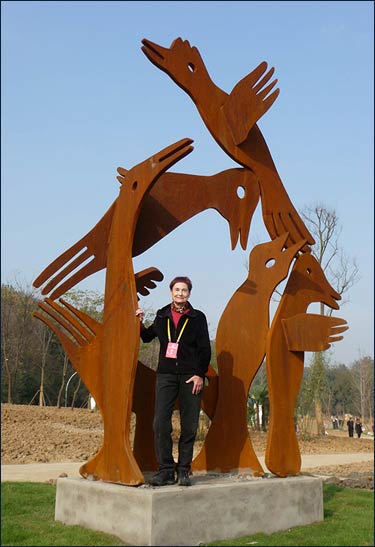By Avigayil Kadesh
As Israel-China business is booming, so are tourism, educational and cultural ties between the two countries – one with a population of eight million, the other 1.3 billion.
 Meeting in Tel Aviv, from left, Shai Givon of LycoRed Makhteshim Agan Group; Lu Qiuming of the Trade Zone Authority in Changzhou; and PTL Group CEO Zvi Shalgo
Meeting in Tel Aviv, from left, Shai Givon of LycoRed Makhteshim Agan Group; Lu Qiuming of the Trade Zone Authority in Changzhou; and PTL Group CEO Zvi ShalgoIsrael and China established diplomatic relations in 1992. The number of Chinese tourists in Israel has risen progressively ever since; this year’s projected number is 28,000. The Israel Tourism Ministry recently unveiled simplified visa procedures in hope of more than tripling that number in the next few years.
Despite differences in size, language and cultural norms, Israel and China each take pride in histories stretching back millennia, and also share a future rooted in the rapidly advancing technologies that will propel their economies through the 21st century.
“Israel is an important partner to us,” says Lu Qiuming, chairman of the Jiangsu Wujin Economic Zone (WEZ) in Changzhou, China, where an industrial incubator initiative for Israeli companies was established in 2011. “We both have a long history and culture, and extensive cooperation in both official and non-governmental ways.”
On a five-day trip to China in May 2013, Israeli Prime Minister Benjamin Netanyahu announced that joint R&D teams are to be set up between Israeli and Chinese research agencies, concentrating on aspects of water technology and renewable energy.
This is just one more indication of the positive trend in Israeli-Chinese collaboration for the good of the planet and the people who live on it.
‘High knowledge and strong growth potential’
Business opportunities have been brewing between Israel and China for more than a decade. Many Israeli inventions are not only manufactured in China and backed by Chinese financing, but also find eager buyers in the vast Chinese commercial and consumer markets.
Zvi Shalgo, chairman of the Israeli Chamber of Commerce in Shanghai, founded the
PTL Group in 2000 to offer Israeli companies help with logistics, manpower and financial services as they enter the Chinese workplace. PTL also founded a joint VC investment fund.
Of about 100 PTL projects active today, one of the most ambitious is WEZ, the Changzhou Industrial Incubation Initiative in the city of 80,000 industries. One of the first to take up the offer of attractive incentives was Israel’s
LycoRed, a nutritional supplement company that built a turnkey factory in Changzhou three years ago.
Israeli information technology provider Matrix Global has since opened a mobile application development center in Changzhou, and
Lexifone, maker of a new app that automatically translates phone conversations is the latest Israeli business to plan on building a research center there.
While in Tel Aviv to sign the deal with Lexifone’s Ike Sagie, Changzhou Vice Mayor Fang Guoqiang joked that the book Start-Up Nation ought to include a chapter on the rapidly expanding Israeli presence in China.
"China plays an important role in sourcing Israeli imports and advancing market competition,” acknowledges Arie Zief, vice president of the Federation of Israeli Chambers of Commerce.
Potash to prawns
Everything from Israeli potash to Chinese pick-up trucks is traded between the two countries. Israeli-made communications processors are powering China Telecom's fiber access services and Chinese walkie-talkies.
But China also looks to Israel for knowhow in many growth areas.
In April 2013, Chinese healthcare giant Shanghai Fosun Pharmaceutical paid $240 million to acquire a 95.6 percent share of Caesarea-based
Alma Lasers, a leading manufacturer of products for aesthetic and medical applications.
In its efforts to boost domestic milk production, China sent two cohorts of dairy farm management trainees for 11-week courses in Israel organized by AfiMilk, a world leader in computerized systems for dairy farm and herd management. The kibbutz-based company’s staff in Beijing helped plan and equip 105 milking parlors in China.

AfiMilk's Pinhas Gur and Charles Zhou, AfiMilk China general manager Israel's IDE Technologies constructed the largest
desalination plant in China. The IDE installation is said to be 50 percent more efficient than any other thermal desalination facility in operation today.
A couple of years ago, 13 senior-level officers from China came to Israel’s Galilee International Management Institute for
two weeks to learn Israeli methods in water management and agriculture.
“The Chinese … want to come to Israel to see how this amazing and smart people have survived in the Middle East. It’s a mystery to them, and they are very curious about Israel,” said Yani Xie, director of cooperation with China at the institute.
Israel’s
Dip-Tech Industries, pioneer of a revolutionary technique for printing digitally on exterior glass walls, has a sales office in China. And the Israeli shipping company Tiran Group’s aquaculture farms in China are experimenting with new technologies in prawn mating.
Even the Chinese film industry is getting into the act. Actors and support crew took the 12-hour flight from Beijing to Tel Aviv to make the first
Chinese feature film in Israel -- a romantic comedy shot in locations including Jerusalem, Tel Aviv and the Dead Sea. The Tourism Ministry is working toward building on this precedent by enticing more Chinese filmmakers to consider Israel.
Medical expertise is sought from Israel as well. For example, Rambam Medical Center gynecological oncology chief Dr. Amnon Amit spent three weeks in northeastern China showing local surgeons how to use advanced laparoscopic procedures in treating ovarian and uterine tumors.
"They believe the Israeli people are very wise and successful since we have done amazing things in just 60 years,” comments Amit. “They went for many years without any connection to the Western world, and now they want to follow our example of quick success."
Learning about each other
Cultural and academic partnerships are also blossoming. At the end of September, it was announced that Hong Kong’s Li Ka-shing Foundation will give a grant worth $130 million to the Technion–Israel Institute of Technology to upgrade the home campus in Haifa, alongside a $150 million investment by the governments of Guangdong Province and Shantou municipality to build a Technion-affiliated campus in China to train future engineers and computer scientists.
Earlier in the month, Tel Aviv University President Joseph Klafter and Tsinghua University President Chen Jining signed a memorandum of understanding for collaboration on an unprecedented scale in Beijing, China, in the presence of Israel Ambassador to China Matan Vilnai and leaders of the Israeli business community in Beijing.
The two universities “will pursue a strategic cooperation in innovative research and education for the mutual benefit of both institutions and nations,” according to the memo. They intend to co-establish a unique joint center, the XIN Center, as an international hub for scientific and technical innovation.
XIN ("new" in Chinese) is expected to “advance interdisciplinary research, provide optimal conditions for creativity, and promote activity in fields that can truly impact society in both countries and the entire world.”
The research center will initially focus on fields that are already in accelerated stages of development in Israel and in China, such as nanotechnology, but in time it will expand to other areas of science. “The Center will aspire to provide an answer to grand challenges and its projects will work toward combining forces with the high-tech industry,” the document states.
This development followed close on the heels of a trip by a group of Israeli academics to six top Chinese universities, led by Hebrew University of Jerusalem (HUJI) President Menahem Ben-Sasson. HUJI prepares to open a Confucius Institute to promote Chinese language, culture and history similar to one that has already been active at Tel Aviv University since 2007.
Also on the academic front, since 2011 the Israel-based Sino-Israel Global Network & Academic Leadership (
SIGNAL) has established seven Israel studies program in Chinese universities – a first in Chinese history.

Carice Witte, executive director and founder of SIGNAL,
with Shanghai International Studies University Vice President
Prof. Yang Li at the university’s 2012 Israel Studies ConferenceSIGNAL brings faculty from the partner schools to Israel for a semester of teacher training, and also sends Israeli professors to the Chinese universities through a visiting seminar program.
The organization also established the Center for Contemporary Sino-Israel Studies at the International Relations School of Shanghai Jiaotong University, to lay the groundwork for bilateral research and exchanges between the countries, and is establishing a year-abroad program in Israel for Chinese college students.
“China defines itself as a growing 'great power' and is actively interested in learning from Israel’s entrepreneurial and innovative high-tech successes as well as its cultural national achievements,” according to SIGNAL founder Carice Witte.
Artistic cooperation
Towering iron sculptures commissioned from
Israeli sculptress Dina Merhav stand in the Beijing Olympic Park, at a Shanghai sculpture park and at the YUZI Paradise international sculpture park in southern China.

Israeli sculptress Dina Merhav in Wuhu, China,
with her sculpture “Heaven’s Harmony.” Merhav’s relationship with the Chinese arts establishment goes back more than a decade, so it’s not surprising that Madame Gao Yang Ping, the Chinese ambassador to Israel, was guest of honor at the Israeli artist’s November 2012 Tel Aviv exhibition, “Birds in Chinese.”
The relationship goes the other way, too. In Jerusalem, a team of 60 Chinese ice sculptors from Harbin was flown in to create an ice bus, ice slides, ice mazes, ice rainforests, ice snowstorms and ice bridges for the
Ice City event debuting in March 2012. They made their chilly magic again for the following year’s festival, at which a Chinese acrobatic dance troupe performed on a specially made rink.
Also in 2012, international attorney and Israel-China cultural activist Barry Swersky arranged for a dozen
young Israeli and Chinese pianists to partner up for five days of master classes and concerts at the Jerusalem Music Center. Chinese pianist-conductor Xu Yi-An, who lives and works in Israel, was among the presenters.
Though the kids could not verbally communicate with one another, the program allowed for dialogue of a different kind.
"China today excels in European music and especially in piano," said Prof. Arie Vardi, musical director of the project. "They play the same classics as we have in our repertoire. We have a common language."
Clearly, the common language between China and Israel will continue to provide the basis for future achievements in technology, industry, academia and culture in the years to come.